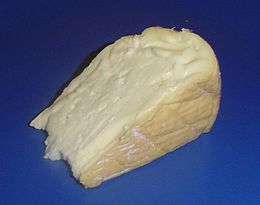Munster (cheese)
| Munster-géromé | |
|---|---|
 |
|
| Other names | munster fermenté, Menschterkas |
| Country of origin | France |
| Region, town | Munster |
| Region | Vosges, Haut-Rhin, Bas-Rhin, Moselle |
| Source of milk | Cow |
| Pasteurized | No |
| Texture | Soft smear-ripened |
| Fat content | 45 % |
| Dimensions | diameter 7-19 cm (when fully dilated), height 2-8 cm |
| Weight | 150 to 1500 g (flat cylinder) |
| Aging time | 5 weeks to 3 months |
| Certification | AOC 31 mai 1978 adapted in 1986 |
Munster (French pronunciation: [mœ̃stɛʁ]), Munster-géromé, or (Alsatian) Menschterkaas, is a strong tasting, soft cheese made mainly from milk from the Vosges, between Alsace, Lorraine and Franche-Comté in France. Munster is derived from the Alsace town of Munster, where, among Vosgian abbeys and monasteries, the cheese was conserved and matured in monks' cellars.
This cheese originated in the Admodiation, an area on the top of the Vosgian mountains of France, named Chaumes" or "Les grandes Chaumes" (comitatus Calvomontensis). Calvomontensis is the Latin for a mountaintop without woods.
As early as 1371, and possibly before, these territories were occupied by cattle herds driven by men, called "marcaires" (from the Alsatian "Malker", Milker in English), pastured there between May and September. When the herds returned to their valleys, the cattle herdsmen first paid the fees and tithes to the religious and political owners of the summer pastures or simply financiers of these migrations. During feudal times these owners possessed all goods, living creatures, rights of pasture and cattle. Those who herded were known as serfs.
This mountain population paid their debts with cheese and jars of butter. The lords were the first religious establishments, women like chanoinesses from Remiremont or from Andlau, or men such as the chanoines or canons from Murbach or Saint-Dié, Benedictines from Munster, Senones, Moyenmoutier, and other monastic areas. Political protectors included the duke of Lorraine, count of Salm, count of Ribeaupierre, and other Alsatian noblemen.
...
Wikipedia
